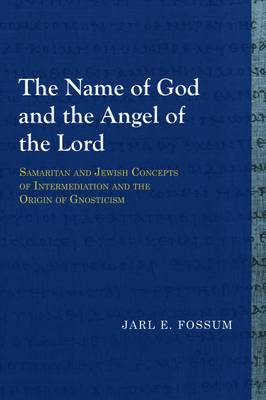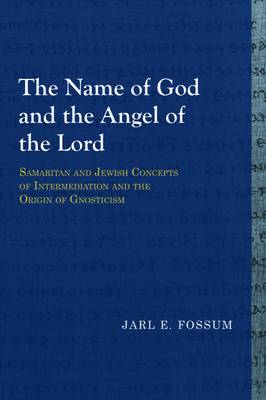
En raison d'une grêve chez bpost, votre commande pourrait être retardée. Vous avez besoin d’un livre rapidement ? Nos magasins vous accueillent à bras ouverts !
- Retrait gratuit dans votre magasin Club
- 7.000.000 titres dans notre catalogue
- Payer en toute sécurité
- Toujours un magasin près de chez vous
En raison de la grêve chez bpost, votre commande pourrait être retardée. Vous avez besoin d’un livre rapidement ? Nos magasins vous accueillent à bras ouverts !
- Retrait gratuit dans votre magasin Club
- 7.000.0000 titres dans notre catalogue
- Payer en toute sécurité
- Toujours un magasin près de chez vous
The Name of God and the Angel of the Lord
Samaritan and Jewish Concepts of Intermediation and the Origin of Gnosticism
Jarl E Fossum
76,45 €
+ 152 points
Description
The relationship among Judaism, Gnosticism, and Christianity perpetually eludes easy description. While it is clear that by the second and third centuries of the Common Era these three religious groups worked hard to distinguish themselves from each other, it is also true that the three religious traditions share common religious perspectives.
Jarl Fossum, in The Name of God and the Angel of the Lord, examines this common heritage by proposing that the emergence of an anticosmic gnostic demiurge was not simply Gnosticism's critique of the Jewish God or a metaphysical antisemitism. The figure of the gnostic demiurge arose from Judaism itself. Fossum demonstrates that the first gnostic versions of the demiurge constituted a subordinated dualism. Fossum then turns to Judaism, in particular Samaritanism's portrayal of a principal angel. In distinction from non-Samaritan Jewish examples--where the Angel of the Lord bears the Divine Name but is not a demiurge, or examples where the Divine Name is said to be the instrument of creation but is not an angel or personal being--Fossum discovers a figure who bore God's name, was distinct from God, and was God's instrument for creation. Only in Samaritan texts is God's vice-regent personalized, angelic, demiurgic, and the bearer of God's name. In the end, The Name of God and the Angel of the Lord reveals that not all gnostic speculation was anti-Jewish and, indeed, emerging gnostic and Christian traditions borrowed as much from Judaism as they criticized and rejected.Spécifications
Parties prenantes
- Auteur(s) :
- Editeur:
Contenu
- Nombre de pages :
- 391
- Langue:
- Anglais
- Collection :
Caractéristiques
- EAN:
- 9781481307932
- Date de parution :
- 15-07-17
- Format:
- Livre broché
- Format numérique:
- Trade paperback (VS)
- Dimensions :
- 152 mm x 229 mm
- Poids :
- 585 g

Les avis
Nous publions uniquement les avis qui respectent les conditions requises. Consultez nos conditions pour les avis.






